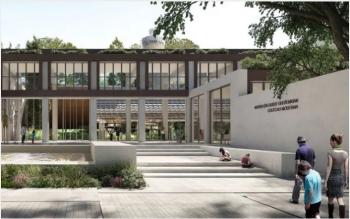Gulbenkian Foundation
The Gulbenkian Foundation is a wealthy international philanthropic institution based in Lisbon, Portugal, dedicated to improving the quality of life through the areas of arts, charity, science, and education. It was established in 1956 according to the last will of billionaire philanthropist Calouste Sarkis Gulbenkian (1869-1955), an Armenian oil magnate and art collector.
The Foundation operates a range of institutions and initiatives primarily from its headquarters in Lisbon, which is set within a large park and architectural complex that includes the Gulbenkian Museum, which houses the founder's private collection of over 6,000 pieces. These range from antiquity to the early 20th century, including Egyptian, Greco-Roman, Islamic, and European art. There is also a Modern Art Centre containing a significant collection of modern and contemporary Portuguese art. The Gulbenkian Science Institute is an international centre for biological and biomedical research, offering graduate training. There also exists an Art Library and Archive. The Foundation has representatives in London and Paris contributing to its global mission. The Foundation also awards the annual €1 million Gulbenkian Prize for Humanity, which recognises outstanding contributions to tackling climate change.
There is a relationship between many UK art-related organisations, including the Hatton Gallery (located at Newcastle University) and the Gulbenkian Foundation, primarily through financial grants and collaboration in the arts sector.
Get Unlimited Access from just £5



